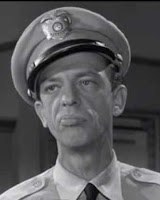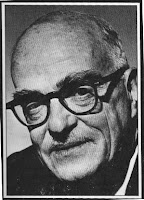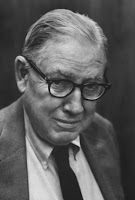Judge Percy Mettrick
[played by Otto Kruger]: “In the 5th century B.C., the citizens of
Athens, having suffered grievously under a tyrant, managed to depose and banish
him. However, when he returned some years later, with an army of mercenaries,
those same citizens not only opened the gates for him, but stood by while he
executed members of the League of Government. A similar thing happened about
eight years ago in a town called Indian Falls. I escaped death only through the
intercession of a lady of somewhat dubious reputation—and uh, the cost of a
very handsome ring which once belonged to my mother. Unfortunately, I have no
more rings.”
Marshal Will Kane
[played by Gary Cooper]: “You're a judge!”
Judge Mettrick:
“I've been a judge many times in many towns. I hope to live to be a judge
again. Why must you be so stupid? Have you forgotten what he is? Have you
forgotten what he's done to people? Have your forgotten that he's crazy? Don't
you remember when he sat in that chair and said, 'You'll never hang me. I'll
come back. I'll kill you, Will Kane. I swear it, I'll kill you'?”—High Noon (1952), screenplay by Carl Foreman, adapted from the short story
“The Tin Star,” by John W. Cunningham, directed by Fred Zinnemann
I wish I could simply put up a straight, idealistic
post this Fourth of July about the brilliance of the Declaration of
Independence and rest easy about the state of the nation it brought into being.
But the survival of this country and its institutions has always been tested,
and never so much in my lifetime, anyway, as in the last several years.
The American western is a genre adaptable enough to explore
all kinds of conflicts, but few were done so searingly as High Noon. As
I explained in this blog post from 11 years ago, on the 50th
anniversary of this classic film’s release, many in Hollywood interpreted it as
a veiled allegory against McCarthyism.
Although I accept that as the motive for the
screenplay by Carl Foreman (who, for his own refusal to “name names” about past
Communist associations, was blacklisted by Hollywood after the movie’s release),
I believe now that it’s a mistake to view it in such limiting terms.
Nearly 70 years after the Senate finally mustered
enough votes to censure Joseph McCarthy for behavior “contrary to senatorial
traditions,” and more than 65 years after the Senator from Wisconsin died,
alcoholic and ignored by the press corps that fueled his rise, High Noon’s
message about the danger to American democracy posed by the exploitation of
fear rings more loudly now than ever before.
I tried unsuccessfully to find a film still I could
use for the above dialogue between Gary Cooper and Otto Kruger, but maybe it
was all for the best. The one I chose powerfully illustrates one of the major
themes of High Noon: the overwhelming loneliness of a single man who
tries to save a once-bustling community that has suddenly, catastrophically
lost the desire to save itself.
Look again at Judge Mettrick’s exchange with Marshal
Will Kane. Surely you’ve heard recently about a lawbreaker who somehow slipped
through the clutches of civil authority, now vowing “retribution” against those
who dared to stop him? About a bully that those who crossed him before now want
to avoid encountering at all costs? About his repeated threats made with
impunity, just daring the authorities to act against him again—a challenge they
are reluctant to accept?
For Marshal Kane, the man who must be confronted is
Frank Miller; for contemporary American democracy, it’s Donald Trump.
The good citizens of the New Mexico frontier town of
Hadleyville (with its faint echo of “Hollywood”) shirk Kane’s urgent request to
join his posse against Miller and his three confederates.
Among the pleasures of the film that I’d forgotten was
the absolutely apt dialogue for each character—not only deftly capturing their
motivation but also their class, educational level, and other defining
socioeconomic and psychological features.
The lines that screenwriter Carl Foreman crafted for
Judge Mettrick differ markedly in tone from every other character. They seem
almost to have been ripped from the typewriter of Joseph L. Mankiewicz, the All
About Eve writer-director famous for his polished, sophisticated, caustic
dialogue spoken by well-educated, cultured characters.
You won’t find any other figure in High Noon besides
alluding to ancient history—nor one copping, like a man among men, to his sins
of the flesh.
The judge should have been the type of person that Thomas
Jefferson had in mind when he advocated for “the incalculable advantage of
training up able counselors to administer the affairs of our country in all its
departments, legislative, executive and judiciary.”
But when a crisis comes, Mettrick—who had officiated at
the wedding ceremony for Kane and his bride Amy—now reveals himself to be
cynical and craven. Having previously sentenced Miller to death, he can’t wait
to pack his precious law books and gallop off—and even insults Kane for not
being similarly guided by self-preservation. If he can’t serve as a judge in
this town, he’ll find another.
Even so, Mettrick has a ready-made excuse to avoid
confronting Miller and his increasingly extortionate demands: “This is just a
dirty little town in the middle of nowhere. Nothing that happens here is of any
importance.”
Audiences in the aftermath of WWII would have
recognized in that rationale an echo of British Prime Minister Neville Chamberlain’s
explanation that he wouldn’t back Czechoslovakia when threatened by Adolf Hitler
because it was all “a quarrel in a far-away country between people of whom we
know nothing.”
Marshal Kane is his polar opposite: stubbornly
committed to sticking to his guns come what may, even though he can only
express his reasons why with minimal words (“There’s not enough time,” “I just
can’t”), and even though he knows the likelihood is high that he’ll be killed.
Incredibly, it is the forthright Kane who finds himself
on the defensive rather than the murderous Miller when he asks for help at a town
church service. In anticipating the “What about”-isms that MAGA supporters
often hurl at critics of Trump, a parishioner asks why Kane hadn’t jailed the “three
killers walking the streets bold as brass.”
But Mettrick’s is an especially egregious abdication of
responsibility. By virtue of his education and office, he’s supposed to act differently.
But his decision to flee is more hasty, more cowardly and more resounding a
civic and moral failure than almost anyone else’s in the community.
During the postwar Red Scare that Joseph McCarthy used
as a springboard to influence, Hollywood executives—and more than a few lawmakers
on Capitol Hill—reacted in a manner similar to the judge’s, as the senator abused
the powers of his office and insulted even members of his own Republican Party.
That scenario will seem oddly familiar to observers of
the current Presidential race, as Donald Trump demands the absolute loyalty
required of a mafia kingpin and publicly degrades anyone who falls short of
that standard.
(Witness his treatment at a South Carolina rally of his
almost slavish ally Lindsey Graham, with the bachelor senator smiling and
squirming nervously as Trump observed, “You know, you can make mistakes on
occasion. Even Lindsey down here, Sen. Lindsey Graham.”)
In Michael Tomasky’s roundtable discussion with
four former Republicans printed in the June issue of The New Republic,
MCNBC commentator Nicolle Wallace cited Ohio Senator Rob Portman as “the best
avatar for why the country is at risk”:
I don’t know of anybody who knows better
than Rob Portman. He was George W. Bush’s OMB [Office of Management and Budget]
director. He also wore a second hat as sort of wise man and an adviser. And I
knew the country was fucked when he didn’t walk away from Trump after good
people on both sides did, when he stayed with it after grabbing the
you-know-what.
If we are to surmount the legal and political crisis
engulfing our republic, we will have to act collectively like Will Kane—counting
on years of experience, bravery, and sometimes guile, to defeat the bad guys, even
as we fear that much of what we once loved in our community’s institutions and
spirit might be irretrievably damaged by a bully with utter contempt for norms.



.jpg)



























